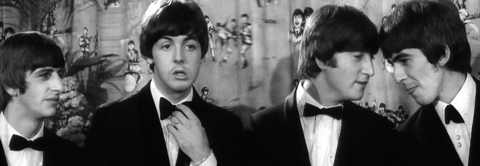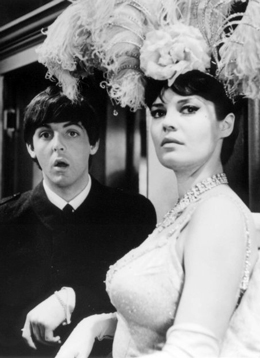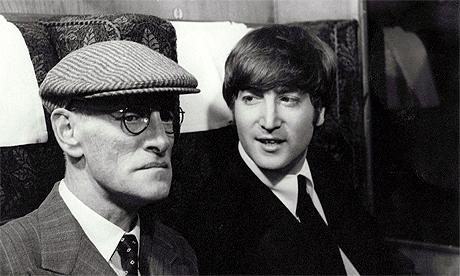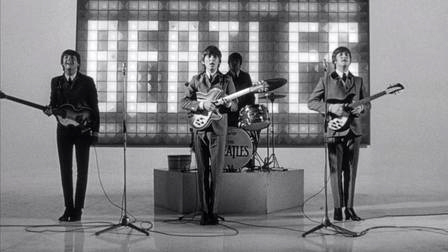|
|
Reviewed by Glenn Erickson
In 1964 everyone under age 25 seemed to be a Beatles fan. The big wave hit America hard and fast early in the year. The four British 'lads' were a breath of fresh air, a welcome break from assassinations and nuclear standoffs. Their songs were rich with melody and the 'new sound' that we were all told was happening in England. We were hungry for every snippet of B&W news footage of the Beatles smiling and making clever jokes in their unique suits and mop top haircuts. They just plain could do no wrong, as if they held the copyright on fun and happiness. For Gods such as these, movie stardom couldn't be far off.

A Hard Day's Night turned out to be one of the happiest movie deals of the 1960s. David Picker signed United Artists on barely knowing what he was getting into, and the deal was closed so quickly that UA ceded ultimate ownership to producer Walter Shenson. But the choice of director was ideal for all parties. The Beatles had no intention of making a standard rock 'n' roll exploitation picture of the time. For every Jailhouse Rock, four major embarrassments showed unhappy singers lip-synching to playback and sharing the stage with whatever pop act the record companies were pushing that year. The Beatles were particularly allergic to the way musical talent was packaged and marketed talent, as with Cliff Richard. American director Richard Lester had worked with The Goons and Peter Sellers, and the Beatles approved of his anarchic approach to comedy. Working with a script by Alun Owen, a writer familiar with Liverpool argot, Lester fashioned a wild 'day in the life' farce that combined convincing newsreel-like action with a satire of London's pop music culture. Viewers would get plenty of privileged time to hang out with the four most admired young men in the world.
Although scripted, A Hard Day's Night is so freely structured that audiences thought the Beatles were making it all up as they went along. We see a couple of days in the lives of the Fab Four as they avoid teeming mobs of teenaged girls, attend parties, give reporters grief and amuse each other in hotels and on trains. They play their public personalities, ratcheted up three notches in cleverness. Paul's crotchety grandfather (Wilfred Brambell) gets in constant trouble making petty side deals; Ringo becomes melancholy and wanders off just as rehearsals for their big television performance get underway. The neurotic Telly director comes unglued - will they make it back to the studio by airtime?

There's nothing quite like this film: it's hard to imagine a way to better introduce the Beatles to the mass audience. The show often takes on the look of a verité documentary, and displays a cutting style that captures perfectly the Beatles' impish sense of humor and effusive spontaneity. The lads give their minders headaches while tormenting (in good fun) the fussy BBC types preparing a video concert. Although never as bleakly absurd as an average Goon skit, the comedy draws upon silent-movie slapstick and silliness for its own sake -- but always in the service of character. Some of the interactions the Beatles have with passersby are inspired, such as John's impromptu faux love scene with an actress (Anna Quayle) in a narrow hallway. We see a constant flow of sidebar gags, such as the car thief ignored by the Bobbies that dash about like Keystone Cops. As if realizing that a break from the hectic pace would be a good thing, Director Lester took time out for the slower sequence in which a lonely Ringo wanders down by the riverbank. Without his mates he's just another sad-faced bloke. The movie hit most viewers with a new kind of performing sensation, presented with a stunning new visual approach. Lester extended this anarchic line of comedy in his follow-up romantic comedy The Knack ... and How to Get It.
Great care was taken to integrate the musical interludes into the film fabric. The first is the most daring -- the boys are playing cards in a train's baggage car when one of their songs is hears. Across a cut they've suddenly unpacked their equipment and are performing to a small audience of fans peering through a wire mesh fence. The reality switches without warning, and then switches back but it all seems perfectly natural. The other songs are quasi- rehearsals, open performances, instrumentals played over appropriate sequences -- and the revolutionary "Can't Buy Me Love" sequence, that compresses the energy of a year into one brief music video-like playground romp. George Martin arranged a half-dozen instrumental cuts that would now be classified as easy listening covers. Since UA's original soundtrack is no longer in print these can only be heard in the movie. 1 The best is Martin's arrangement of "This Boy", which becomes a theme for Ringo. The fireworks are of course reserved for the finale, when The Beatles perform for a hall packed with screaming teenage girls. Brilliantly edited, it immediately ignited the explosion of Beatlemania -- American kids yelled and cheered in film screenings as well.

A Hard Day's Night made us think we were privy to the 'true' personalities of the Beatles. It's as scripted as any other show, yet places the four non-actors in such familiar situations, that they often seem to be 'behaving' more than acting. Today an entire PR company would be in charge of the 'spin' given the Beatles' image, but in this movie those decisions seem to have been arrived at by pure professional insight. The boys are mostly kept away from their hordes of star-crazed fans, leaving their status vaguely 'available' -- no girlfriends (or wives) are in evidence to make the average female fan feel resentful or inadequate. The tearful, hysterical girls that pour out their hearts screaming at the finale are a phenomenon that the Beatles couldn't deal with individually, so the only recourse was to be remote Gods of music. The movies flattened and scrubbed Elvis into a boring self-parody, but with intuitive marketing savvy (no committee, no focus group) the Beatles' renown was instantaneously amplified tenfold. United Artists got an incredible bargain, but the Beatles became superstars bigger than anything Hollywood had seen in decades.
The hotel staff, reporters, and television personnel are wildlife naturally found in the Beatles' habitat. Amusing Wilfrid Brambell gets equal attention, and luckily isn't too distracting. His character gives the boys someone to bounce off of and argue with. Grandfather's sour, caustic attitude also provides a baseline to insure that the Beatles' constant snippy remarks don't come off as cynical. The neurotic fashion exec (Kenneth Haigh) doesn't recognize George and tries to squeeze him as a resource for 'what the kids think'. The scene shows the Beatles transcending marketing hogwash, mainly by ignoring it. George is soon shown the door, but not before introducing a new word to the lexicon: grotty.

This one movie is perhaps the greatest national advertisement England ever exported. Contrasted with the violent divisiveness blanketing the news media here in the States, that island looked like Utopia. The police were sweet and thoughtful. Everyone was into rock music (sure they were...) and Youth seemed to rule all. America was hungry for more. American fans were given their first chance to see what the Beatles were like. It differentiated them into categories: the cute one, the cool one, the quiet one and the funny one. With modifications, these public images stayed the same throughout their careers. The later frustration for the Beatles revolved around their need to personally evolve beyond the personalities so firmly established here.
The Criterion Collection's Blu-ray + DVD of A Hard Day's Night is a definitive edition of this beloved rock musical filmed in a style that refuses to show its age. The B&W HD transfer pulls everything out of Gilbert Taylor's marvelous images, transporting us back to the days when everything from England seemed perfect -- even if civilians in the street are almost always wearing raincoats.
A DVD from 2002 remixed the audio, replacing the songs only with stereophonic versions that overpowered the images. Criterion offers three audio choices, an original monaural track plus new stereo and 5.1DTS-HD Master Audio surround mixes, all uncompressed on the Blu-ray.
The new disc has overcome a limitation of the older DVD extras -- Criterion is able to use Beatles music where appropriate, out of context with the film itself. A 2002 commentary offers filming memories from cast and crewmembers, but the Collection's excellent video extras are a comprehensive resource. In Their Own Voices (18 minutes) edits interview material with the Beatles to produce an opinion montage about the making of the film. You Can't Do That is a 1994 anniversary docu that includes an outtake of a Beatles song. Things They Said Today is a nicely assembled compendium of interviews, stills and clips and is also from the 2002 DVD. No Beatles music is heard. Helpful little arrows identify marginal actors and personalities in the clips. Richard Lester has the best quote: "They told me I was the father of MTV. I wrote back and demanded a blood test."
In Anatomy of a Style a story editor and music editor discuss the treatment of the film's musical sequences. Picturewise is a thoughtful video essay on Richard Lester by David Cairns, narrated by Rita Tushingham. Beatles biographer Mark Lewisohn's The Road to A Hard Day's Night is an excellent, concise history of the quartet from their teenaged beginnings up until the production of their first movie. The final video extra is Lester's Oscar-nominated The Running Jumping & Standing Still Film (1960), a short comedy made with The Goons. Two reissue trailers are included as well.
The fat insert booklet (80 pages) contains an essay by Howard Hampton and interview excerpts from director Lester. Criterion's disc producer is Kim Hendrickson.
On a scale of Excellent, Good, Fair, and Poor,
A Hard Day's Night Blu-ray + DVD
rates:
Movie: Excellent
Video: Excellent
Sound: Excellent
Supplements: Audio commentary with cast and crew members*, documentaries In Their Own Voices; You Can't Do That: The Making of A Hard Day's Night and Things They Said Today"*. New featurettes Picturewise*, a visual essay by David Cairns about director Lester; and Anatomy of a Style, about the music sequences. Richard Lester's The Running Jumping & Standing Still Film (1960)*, The Road to A Hard Day's Night is hosted by author Mark Lewisohn*. The insert booklet carries an essay by critic Howard Hampton and Lester interview excerpts. -- (*on Blu-ray only)
Deaf and Hearing-impaired Friendly?
YES; Subtitles: English
Packaging: Keep case
Reviewed: June 17, 2014
Republished by permission of Turner Classic Movies.
Footnote:
1. From Mark Grimmett, 7.02.14:
Glenn, Just read and enjoyed the Hard Day's Night review, and wanted to let you know that the original UA soundtrack, complete with instrumentals, is indeed now back in print. All the US albums were reissued on CD back in January. This was, of course, about a month after I'd paid about 20 bucks for a 'needle-drop' recording of the album on eBay. Enjoy the holiday weekend! -- Mark Grimmett
Return

Text © Copyright 2014 Glenn Erickson
See more exclusive reviews on the Savant Main Page.
The version of this review on the Savant main site has additional images, footnotes and credits information, and may be updated and annotated with reader input and graphics.
Return to Top of Page
|

